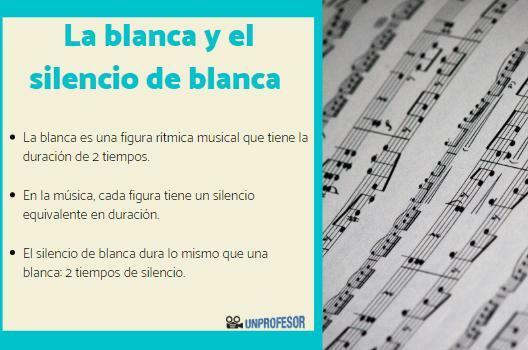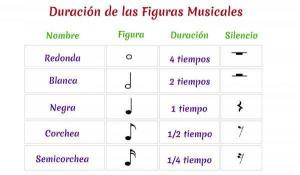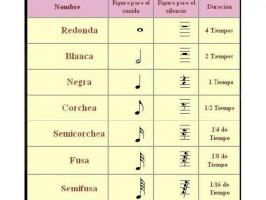The white and the silence of white

Every work is composed of elements and details that make up a whole... In music, that is why we call a work composition. Music is a wonderful art because apart from being expressive, mathematical and scientific at the same time, it is multidimensional by playing not only with sound but with time. We call this element in music rhythm and it is a crucial aspect for a composition. In this lesson from a TEACHER we will learn about theWhite and the silence of the white, one of the rhythmic figures we use to compose musical works.
Index
- What is the white and the silence of white
- What is a rhythmic figure
- How to recognize and write musical figures
- Duration of musical figures
- Musical notes that share the bracket
What is the white and the silence of white.
The White is a rhythmic musical figure which has the duration of 2 times. In music each figure has a silence equivalent in duration, the silence of white, as its name indicates, lasts the same as a white: 2 times of silence.
If you are new to learning music, you may not know some or several musical terms, but do not worry, since in this article we will also talk about some basic concepts to understand rhythmic figures and its use in the world of music.
What is a rhythmic figure.
"Figure" is a way of calling a symbol, since in music we have several symbols to identify some functions. In this case, when we speak of rhythm we refer to the succession of sounds (with or without tuning), which depend on the duration(when it takes time) and the frequency with which they appear (the times of repetitions in a defined period of time).
As we mentioned, music uses different symbols and has its own writing language, a series of figures that differ from each other and that have a specific function. The rhythmic figures have their own symbols and allow us to define the durations and values, in such a way that we can read and write music in a score.
How to recognize and write musical figures.
To recognize each musical figure you must know about the anatomy of a musical note. The drawing of a note consists of 3 parts: head, stem and bracket. Not all musical figures have all 3 parts, so based on this and the drawing of the parts they have, we can identify a musical figure.
Finally, for the silences, we must memorize their drawings, since they have specific symbols to write and recognize.
Duration of musical figures.
The duration or value of each musical figurewe measure it with "time" in the music. Each musical figure has an assigned amount of times, both for notes and for rests. The duration in times of the musical figures are as follows:
Notes duration
- Round = 4 times
- White = 2 times
- Black = 1 time
- Quaver = 1/2 time
- Semiquaver = 1/4 time
Duration of silences
These would be the equivalent values of the notes but as rests:
- Silence of round = 4 times
- Silence of white = 2 times
- Silence of black = 1 time
- Eighth note silence = 1/2 time
- Semi-eighth note silence = 1/4 time
Important: these are just the basic musical figures. There are smaller figures such as the fuse and the semi-fuse. There are also figures of different values such as triplets and sextillos. There are also elements that alter the duration of the notes, such as ties and dotted lines.
Musical notes that share the bracket.
You are likely to find this way of writing musical notes in a score, this happens with notes of shorter duration such as the eighth and semi-eighth notes. The option of drawing them in this way allows them to be organized by groups, so that their reading is easier for the musician. In this case you can recognize the value of these notes by the number of lines that join the brackets, the eighth notes are joined by a dash and the semi-eighth notes by 2.
Now that you know the white and the silence of white among other musical figures, you can practice your musical reading and writing! Also, if you want to practice with what you have learned in today's lesson, you can do the printable exercises with their solutions that we have left you on the web.
If you want to read more articles similar to The white and the silence of white, we recommend that you enter our category of Musical language.



